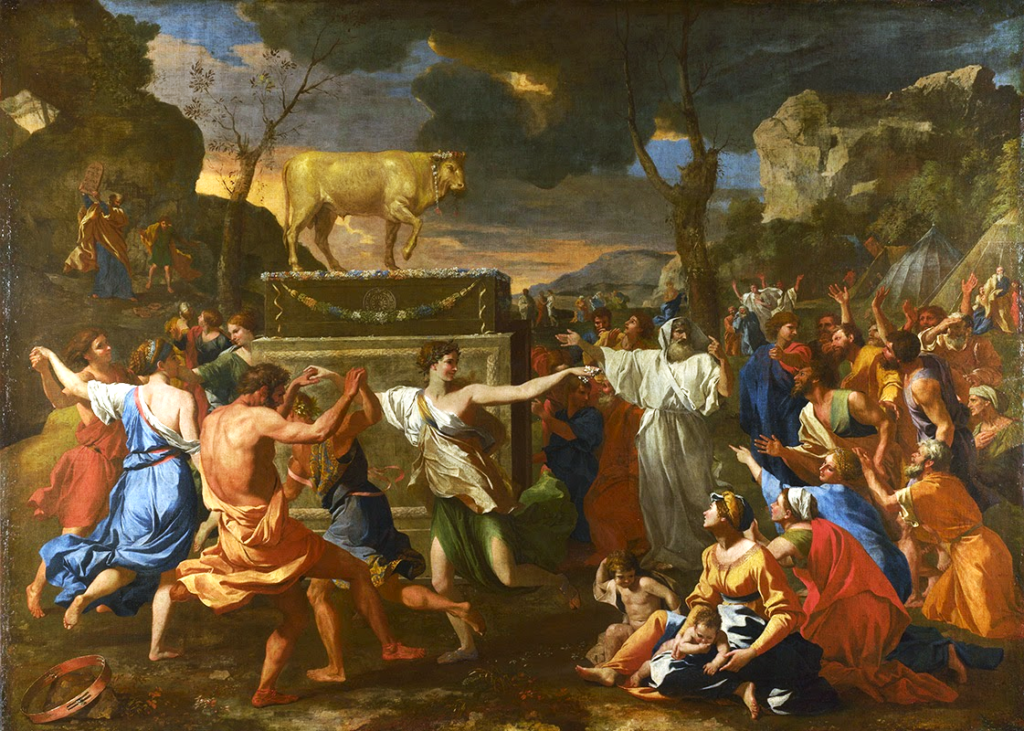Translation From the Holy Gospel According to Matthew
At that time Jesus said to His disciples: No man can serve two masters; for he will hate the one and love the other, or he will sustain the one and despise the other. You cannot serve God and mammon. Therefore I say to you, be not solicitous for your life, what you shall eat, nor for your body, what you shall put on. Is not the life more than the meat, and the body more than the raiment? Behold the birds of the air; for they neither sow nor do they reap, nor gather into barns, and your heavenly Father feeds them. Are you not of much more value than they? And which of you, by taking thought, can add to his stature one cubit? And for raiment, why are you solicitous? Consider the lilies of the field, how they grow; they labor not, neither do they spin: but I say to you, that not even Solomon in all his glory was arrayed as one of these. Now if God so clothe the grass of the field, which is today, and tomorrow is cast in the oven, how much more you, O ye of little faith! Be not solicitous therefore saying: What shall we eat, or what shall we drink, or wherewith shall we be clothed? for after all these things do the heathen seek. For your Father knows that you have need of all these things. Seek ye therefore first the kingdom of God, and His justice; and all these things shall be added unto you.
A Message From St. Augustine’s On the Sermon on the Mount, Chapter 14-16
Then, further, the statement which follows, No man can serve two masters, is to be referred to this very intent, as He goes on to explain, saying: For either he will hate the one, and love the other; or else he will submit to the one, and despise the other. And these words are to be carefully considered; for who the two masters are he forthwith shows, when He says, Ye cannot serve God and mammon. Riches are said to be called mammon among the Hebrews. The Punic name also corresponds: for gain is called mammon in Punic. But he who serves mammon certainly serves him who, as being set over those earthly things in virtue of his perversity, is called by our Lord the prince of this world. A man will therefore either hate the one, and love the other, i.e. God; or he will submit to the one, and despise the other. For whoever serves mammon submits to a hard and ruinous master: for, being entangled by his own lust, he becomes a subject of the devil, and he does not love him; for who is there who loves the devil? But yet he submits to him; as in any large house he who is connected with another man’s maidservant submits to hard bondage on account of his passion. even though he does not love him whose maidservant he loves.
But he will despise the other, He has said not, he will hate. For almost no one’s conscience can hate God; but he despises, i.e. he does not fear Him, as if feeling himself secure in consideration of His goodness. From this carelessness and ruinous security the Holy Spirit recalls us, when He says by the prophet, My son, do not add sin upon sin, and say, The mercy of God is great ; and, Knowest thou not that the patience of God inviteth thee to repentance? For whose mercy can be mentioned as being so great as His, who pardons all the sins of those who return, and makes the wild olive a partaker of the fatness of the olive? and whose severity as being so great as His, who spared not the natural branches, but broke them off because of unbelief? But let not any one who wishes to love God, and to beware of offending Him, suppose that he can serve two masters; and let him disentangle the upright intention of his heart from all doubleness: for thus he will think of the Lord with a good heart, and in simplicity of heart will seek Him.
Therefore, says He, I say unto you, Have not anxiety for your life, what ye shall eat; nor yet for your body, what ye shall put on. Lest perchance, although it is not now superfluities that are sought after, the heart should be made double by reason of necessaries themselves, and the aim should be wrenched aside to seek after those things of our own, when we are doing something as it were from compassion; i.e. so that when we wish to appear to be consulting for some one’s good, we are in that matter looking after our own profit rather than his advantage: and we do not seem to ourselves to be sinning for this reason, that it is not superfluities, but necessaries, which we wish to obtain…
Therefore be not anxious… But seek ye first the kingdom of God and His righteousness; and all these things shall be added unto you. Here He shows most manifestly that these things are not to be sought as if they were our blessings in such sort, that on account of them we ought to do well in all our actings, but yet that they are necessary. For what the difference is between a blessing which is to be sought, and a necessary which is to be taken for use, He has made plain by this sentence, when He says, Seek ye first the kingdom of God and His righteousness, and all these things shall be added unto you. The kingdom and the righteousness of God therefore are our good; and this is to be sought, and there the end is to be set up, on account of which we are to do everything which we do. But because we serve as soldiers in this life, in order that we may be able to reach that kingdom, and because our life cannot be spent without these necessaries, These things shall be added unto you, says He; but seek ye first the kingdom of God and His righteousness. For in using that word first, He has indicated that this is to be sought later, not in point of time, but in point of importance: the one as being our good, the other as being something necessary for us; but the necessary on account of that good…
Hence anything whatever that is sought for the sake of something else, is doubtless inferior to that for the sake of which it is sought; and therefore that is first for the sake of which you seek such a thing, not the thing which you seek for the sake of that other. And for this reason, if we seek the gospel and the kingdom of God for the sake of food, we place food first, and the kingdom of God last; so that if food were not to fail us, we would not seek the kingdom of God: this is to seek food first, and then the kingdom of God. But if we seek food for this end, that we may gain the kingdom of God, we do what is said, Seek ye first the kingdom of God and His righteousness; and all these things shall be added unto you.



